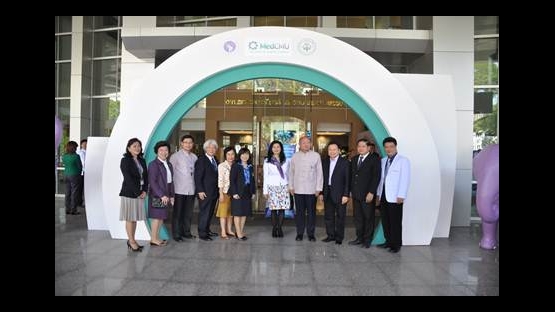At present, the PET/CT and Cyclotron Center of Chiang Mai University (PCCCMU) is the first institution of its kind in Thailand to be located outside of Bangkok. The university currently provides services to approximately 250,000 patients, and is equipped to address a variety of maladies including cancer, neurological disorders, coronary and arterial diseases, and psychiatric illnesses.On 22 May 2014, the Center for Medical Excellence at the Faculty of Medicine of Chiang Mai University, in Thailand, held the Grand Opening of its new PET/CT and Cyclotron Center. The IAEA was represented by Ms Mawieh Oulabi, Programme Management Officer for Thailand.
The objective of the PCCCMU is to provide high standard healthcare technology to patients in Thailand's northernmost regions, and to deliver improved diagnoses and therapeutic treatments for cancer and other chronic diseases like cardiac and dementia.
With the support of an ongoing IAEA technical cooperation (TC) project, the PCCCMU has been able to expand its treatment options, train new personnel, and audit its own performance for safety and quality assurance. The most immediate project benefits for Chiang Mai University come in the form of newly-trained scientists: three nuclear medicine physicians and two medical physicists trained have joined the PET/CT and Cyclotron Center since the TC project began. In addition, three IAEA expert missions have been organized to the Center, to train and advise the medical scientists working there.
In addition to capacity building, the project has helped to establish a new, 200 m2 PET radiopharmaceutical laboratory, complete with a 20 MV cyclotron, five hot cells for PET radiopharmaceutical synthesis, a solid target for Cu-64, I-123 and I-124. Furthermore, a new imaging unit has been established, and includes a PET/CT scanner and a 16-slice SPECT/CT scanner.
With this new equipment, and with freshly-trained employees, the Centre's ability to provide high-end medical images for clinical diagnosis and treatment in northern Thailand has been significantly strengthened. Additionally, the resources provided by the technical cooperation project will facilitate the conduct of future research at Chiang Mai University, in areas that include clinical oncology, cardiology, neurology, PET tracers synthesis, physics of particle acceleration, radiation protection and more.


